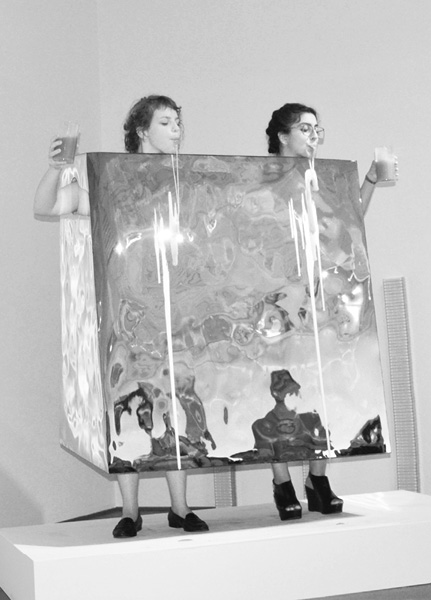
IN THE SUIT, TO WARD OFF THE IMAGE
first performed on August 9, 2013
Chicago Artists Coalition as part of 2013 HATCH Residency, Chicago, IL
performed once in 2013
MOTHERGIRL
KATY ALBERT & SOPHIA HAMILTON
Chicago, IL
724191874e724191874m724191874a724191874i724191874l724191874m724191874o724191874t724191874h724191874e724191874r724191874g724191874i724191874r724191874l724191874@724191874g724191874m724191874a724191874i724191874l724191874.724191874c724191874o724191874m
mothergirlperformance.com
IN THE SUIT, TO WARD OFF THE IMAGE
MOTHERGIRL
(KATY ALBERT & SOPHIA HAMILTON)
The performance of “In The Suit, To Ward Off The Image” began with both performers concealed within a large, trapezoidal, mirrored float which was set upon a white platform in a gallery. Abruptly, our heads, leg and one of each of our arms emerged from the float. We circled the audience members gathered in the gallery, making eye contact with each spectator, then returned to the platform and recited a manifesto while intermittently taking a viscous, caramel-colored syrup into our mouths and spitting it down the sloped front of the mirrored float.
The manifesto began with a polemic, academic tone, as we explained the detrimental effects of The Image; halfway through, the tone transitioned into a cold, instructional self-reflection that guided audience members to release themselves from The Image. The phrase “stop performing” was frequently repeated. The entirety of the manifesto was spoken in exact unison with the exception of the phrases “If I’m looking at you, I own your image. You are the object and I am the subject. But let’s say I’m looking at you and I don’t want to own you, I want to be you,” and the phrase “I feel sexy.” These phrases were spoken by each of us separately, one after the other.
Through the manifesto, we wanted the audience to acknowledge their own role in the performativity and enforcement of gender. We also wanted the audience to see themselves as victims of a system that enforces gender norms. However, many of the sternly delivered instructions or imperatives to the audience, such as “Remember, if you ever get tired of exploiting yourself, you can always quit,” or the contrasting phrases “stop performing” and “now feel sexy,” rendered the manifesto self-referentially absurd and revealed the painful but laughable impossibility of ever escaping the gaze of others. Our phrasing was at times funny—creating tension between phrases of dirge-like repetition in order to manipulate the feeling of the room into laughter. The act of spewing the syrup undercut the rhythmic nature of reciting the manifesto; at the same time, it visually reinforced the destruction of the image by obscuring the reflective surface of the float, so that spectators watched their own reflected images being overtaken by long, cascading drips of syrup.